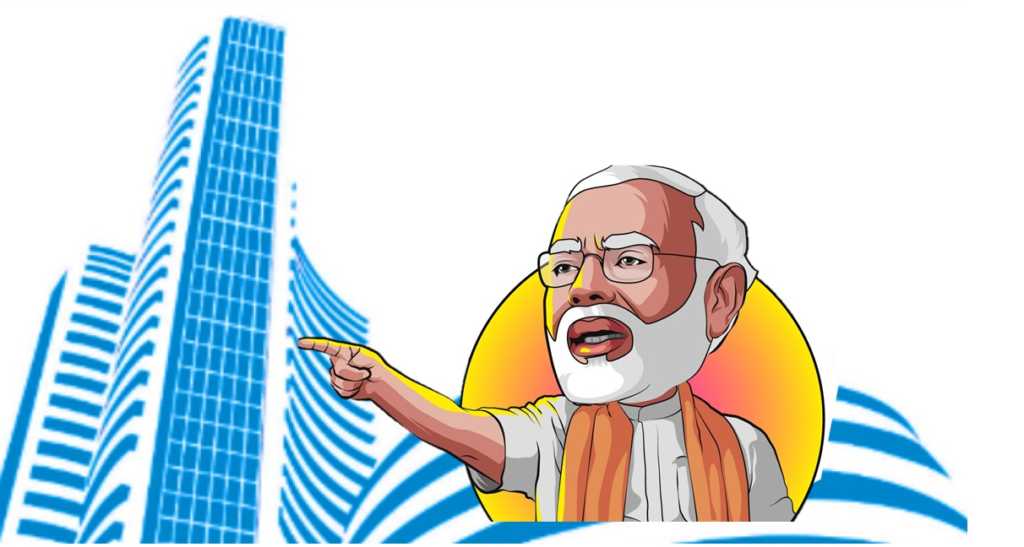The Indian markets loves Modi government, the very day BJP won Lok Sabha elections under Narendra Modi’s leadership, Sensex rose by 0.9 percent. The investors in the market whether domestic or foreign like a stable government therefore when BJP came to power with a full majority the market responded positively. Investor sentiments were so high because after 25 years of coalition governments, a party finally had a majority of its own. Ever since BJP came to power in centre, the performance of the stock markets has been directly proportional to the party’s performance in every subsequent state assembly elections because if the same party is in power in centre as well as the state, there is a coherence in policies. The reformist agenda of BJP is also responsible for an uncanny sync in the performance of BJP and stock markets. And the center of it all, is one man – Prime Minister Narendra Modi.
PM Modi has brought the macroeconomic status of the country to a significantly better condition than what he inherited from the previous UPA regime. The fiscal deficit has come down from about 5% of the gross domestic product (GDP) in 2012-13 to 3.5% of GDP in 2017-18. The inflation rate has been brought down to 4.28 percent from 10 percent in 2012. The GDP growth of the country is at a remarkable 7.3% since the last fiscal quarter. The sound macroeconomic conditions will help India to attain PM Modi’s dream of a double-digit economic growth.
We analyzed the performance of Sensex with respect to BJP’s performance in state elections that took place after Narendra Modi won the historic 2014 Lok Sabha elections. The numbers present a very interesting story.
It is very clear from the table that whenever BJP wins an election the Sensex rises sharply because investors trust Modi government policies. There could be no other explanation to it. They firmly believe that the government is working towards creating a healthy economy out of the socialistic mess that India was. When BJP won the Lok Sabha elections the Sensex rose by 0.9 percent. The same trend was noticed when BJP won Haryana elections with a superlative majority and also went on to become the single largest party in Maharashtra. The Sensex rose by 1.23 percent on that day. BJP performed badly in Bihar electiosn and the indices fell down by 0.55 percent, the same trend was repeated when on 19th of May 2016, BJP lost 4 states out of five. The Sensex registered a sharp fall of 1.19 percent. In the latest Karnataka election BJP ended up as the single largest party and Sensex rose by 0.26 percent but when it could not form the government in the state the very next day the indices fell by 0.18 percent. The only exception to this generalization is the Delhi election where AAP won with a supermajority of 67 seats out of 70, that day Sensex rose by 0.45 percent. It could be the market’s reaction to the old and tainted Congress government going out of power and the personality cult of Arvind Kejriwal who was being considered as a legend killer back then. It could also be understood in terms of the sheer majority that AAP registered, more seats means less tussles in the house and a clear-cut policy formulation.
Narendra Modi proved his credentials as pro-business leader in his long stint as the chief minister of Gujarat. Under his leadership the state registered double digit GDP growth for almost a decade which was highest by any state for such a long period of time since independence. He started the famous “Vibrant Gujarat Summit” to woo domestic and foreign investors, the idea of investors summit was later picked up many other states.
After coming to center as the Prime Minister of the country, he took some bold reforms like demonetization, GST, IBC to improve business conditions in the country. The impact of these reforms is visible in improvement of ease of doing business and a healthy economic growth. Even as the Prime minister of the country. Narenda Modi is perceived to be business-friendly. PM Modi enjoys high trust ratings among international financial institutions like World Bank, IMF, rating agencies like S&P, Moody’s and many others therefore the foreign investors are bullish about Indian economy for as long as Narendra Modi is in power.
